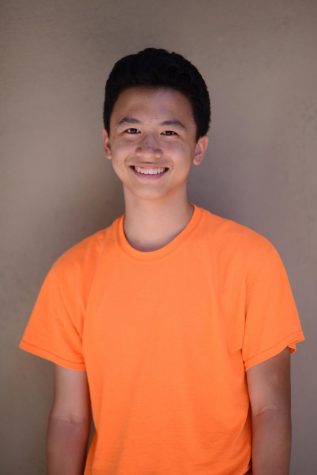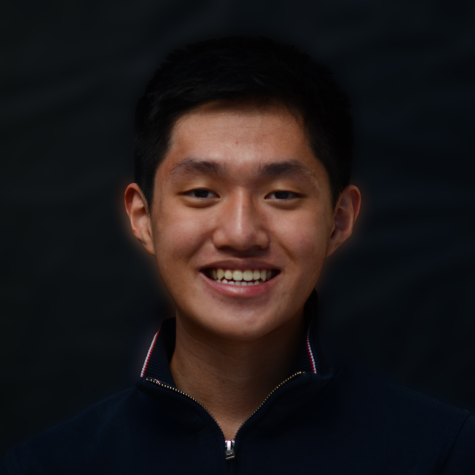Humans of Harker: Soulful strumming
Wilson Zhang bridges musicianship and composition through his love for guitar
“It’s important to keep sight during that period of learning [of] why you decided to pick up the instrument in the first place … If you’re able to recognize that ‘Hey, I’m doing this to build my technique, to play pieces that I want to play, to express myself emotionally however I want to,’ you’ll find that after a while, your instrument will stop fighting you,” Wilson Zhang (’21) said.
Leaning back on a bench, guitar strapped over his shoulder, Wilson Zhang (’21) allows his fingers to gently glide across the strings of his guitar. The soulful notes tremble in the air, and gradually, his eyelids flutter shut. Another chord breathes life into the music; then a trail of arpeggios that colors the air, a lilting melody that sings and sighs a river of emotion.
Wilson first started playing guitar in fourth grade. Wishing to pick up an instrument more exciting than piano, Wilson found the guitar and quickly fell in love.
“[The reason] why I like guitar is closely related to why I like music as a whole because for much of my life, guitar was the only exposure to music I had. I like it because it’s a way to express myself emotionally like most musicians prize in instrumental playing,” Wilson said.
Wilson values the way he can personally interpret music through guitar; there are countless ways to play a piece and add his own emotions and personality into the music.
“My instructors always emphasized that it’s not a situation where you need to look at how one person played it and believe that that’s objectively the right way to play that piece,” Wilson said. “I really appreciate the ability [it gives] as a solo instrument to do whatever I want.”
Later, Wilson began to draw upon his skills in classical guitar in order to play the electric guitar. Wilson remembers this transition as an important step forward in his guitar career.
“My favorite moment, in retrospect, would be taking my experience in classical guitar and shifting it over to electric guitar, and then joining the middle school jazz band in eighth grade, where it served as a transition into my love of ensemble music now,” Wilson said. “I really appreciate that my experience with guitar translated so well and allowed me to bridge that gap between solo and playing with an ensemble.”
Compared to classical guitar, playing electric guitar involves more of a band setting; each musician works in unison. Still, the ensemble allows for moments of inspiration and spontaneity.
“Playing electric guitar, you get to rely upon your fellow musicians a lot more. And as a rhythm section member, you get to support other people playing through chords and such,” Wilson said. “Something about electric guitar that you don’t see at all in classical guitar is improvisation. There’s no music in front of you; it’s only the chords … the director would point at you and say ‘solo,’ and you’ll improvise.”
Although Wilson initially found tapping into his musical spontaneity difficult, he grew to love the ability to express his flashes of musical inspiration.
“It was a jarring transition at first, but the more you do it, the easier it gets. And the easier it gets, the more fun it gets, and the more exhilarating it is to rely on your musical intuition to create something that people will enjoy,” Wilson said.
Instrumental music teacher Dr. David Hart, who has known Wilson since middle school, admires Wilson’s ability to connect with others in jazz band.
“I really love his spirit. In a group, he helps make a really fun learning environment,” Dr. Hart said. “His ability to play hard pieces was incredible … and he has a great sound. I have seen him become more comfortable with being outspoken in classes, and letting his personality be visible to others … His personality has become a huge piece to the personality of the jazz band.”
Wilson has played guitar in Carnegie Hall and on live television. In those moments, he was able to push past nervousness and find confidence in his musical ability.
“It was terrifying [at first], but once I sit down, I really try to focus on my instrument. I treat my instrument almost like a person. And I think to myself, ‘It’s just you and me together up here,’ and I focus, I close my eyes,” Wilson said. “By the time I’m halfway through the piece, I usually forget that I’m even onstage. It’s really exhilarating … you lose yourself … and when I close my eyes, I can rely on auditory sensation.”
Close friend Varun Mangla (12) admires how humble Wilson is despite his numerous achievements in guitar.
“[Wilson’s] very humble. He’s very accomplished, but he doesn’t really brag about any of that. He’s very down to earth and doesn’t act all high and mighty,” Varun said.
It’s been a long journey from when Wilson first started playing guitar. Along the way, Wilson has overcome several challenges.
“The beginning’s always the hardest … [guitar] tends to chafe your fingertips, and you get calluses, so that’s the obvious physical aspect of it,” Wilson said. “But also, I experienced a lot of burnout when I first started guitar because I would keep playing these technique pieces that are known as standards. All of these things are so cut and dry, and [you’re told] you need to practice this for this long and then play these pieces to expand your knowledge of this period.”
Despite the initial obstacles, Wilson persevered, knowing that the technical skills he was developing would pave the way for greater mastery and personal musical expression. By finding meaning in his pieces rather than playing them purely for the sake of playing, Wilson has been able to elevate his skill in and understanding of guitar.
“It’s important to keep sight during that period of learning of why you decided to pick up the instrument in the first place,” Wilson said. “If you’re able to recognize that I’m doing this to build my technique to play pieces that I want to play, to express myself emotionally however I want to, you’ll find that after a while, your instrument will stop fighting you, and you’ll start to learn to appreciate it.”
Besides guitar, Wilson has explored the world of music through other outlets as well. In particular, Wilson has turned more towards musical composition. Towards the latter half of his junior year, Wilson began to learn and experiment with producing electronic music out of a curiosity to explore other genres of music.
“I’ve always listened to electronic music more than I would listen to classical guitar. And at one point, I thought, ‘Dang, am I a hypocrite?’ I don’t even listen to the music even though I love playing so much … I’ve always had an interest in composition, but do I really want to compose for classical guitar?” Wilson said. “So I started experimenting with some simple tools and then dove headfirst into digital audio workstations like Ableton and Reaper. After taking a class, I’ve gotten a fundamental understanding of software to make electronic music.”
Throughout his years in music, Wilson has continually thrived. Moreover, Wilson has developed more confidence and made numerous friends and memories. Moving forward, Wilson hopes to continue pursuing music. With his musical background and talent in guitar, Wilson hopes to be able to dive deeper into modern music production.
“In the future, I don’t want to keep being known as exclusively a guitarist anymore,” Wilson said. “[Electronic music] is at the forefront of the music industry, and during quarantine and our transition back to live performances, I’ve realized that sound recording is going to be pretty important … dealing with the more technical, technological, electronic side of music is the way forward for me.”

Michael Eng (11) is the multimedia editor for Harker Aquila who doesn't do much writing. This is his third year on staff. He enjoys editing videos and...

Nicholas Wei (11) is the managing editor of Humans of Harker. During his third year on staff, Nicholas looks forward to bonding and working with the cubs...


















![“[Building nerf blasters] became this outlet of creativity for me that hasn't been matched by anything else. The process [of] making a build complete to your desire is such a painstakingly difficult process, but I've had to learn from [the skills needed from] soldering to proper painting. There's so many different options for everything, if you think about it, it exists. The best part is [that] if it doesn't exist, you can build it yourself," Ishaan Parate said.](https://harkeraquila.com/wp-content/uploads/2022/08/DSC_8149-900x604.jpg)




![“When I came into high school, I was ready to be a follower. But DECA was a game changer for me. It helped me overcome my fear of public speaking, and it's played such a major role in who I've become today. To be able to successfully lead a chapter of 150 students, an officer team and be one of the upperclassmen I once really admired is something I'm [really] proud of,” Anvitha Tummala ('21) said.](https://harkeraquila.com/wp-content/uploads/2021/07/Screen-Shot-2021-07-25-at-9.50.05-AM-900x594.png)







![“I think getting up in the morning and having a sense of purpose [is exciting]. I think without a certain amount of drive, life is kind of obsolete and mundane, and I think having that every single day is what makes each day unique and kind of makes life exciting,” Neymika Jain (12) said.](https://harkeraquila.com/wp-content/uploads/2017/06/Screen-Shot-2017-06-03-at-4.54.16-PM.png)








![“My slogan is ‘slow feet, don’t eat, and I’m hungry.’ You need to run fast to get where you are–you aren't going to get those championships if you aren't fast,” Angel Cervantes (12) said. “I want to do well in school on my tests and in track and win championships for my team. I live by that, [and] I can do that anywhere: in the classroom or on the field.”](https://harkeraquila.com/wp-content/uploads/2018/06/DSC5146-900x601.jpg)
![“[Volleyball has] taught me how to fall correctly, and another thing it taught is that you don’t have to be the best at something to be good at it. If you just hit the ball in a smart way, then it still scores points and you’re good at it. You could be a background player and still make a much bigger impact on the team than you would think,” Anya Gert (’20) said.](https://harkeraquila.com/wp-content/uploads/2020/06/AnnaGert_JinTuan_HoHPhotoEdited-600x900.jpeg)

![“I'm not nearly there yet, but [my confidence has] definitely been getting better since I was pretty shy and timid coming into Harker my freshman year. I know that there's a lot of people that are really confident in what they do, and I really admire them. Everyone's so driven and that has really pushed me to kind of try to find my own place in high school and be more confident,” Alyssa Huang (’20) said.](https://harkeraquila.com/wp-content/uploads/2020/06/AlyssaHuang_EmilyChen_HoHPhoto-900x749.jpeg)



![“It's important to keep sight during that period of learning [of] why you decided to pick up the instrument in the first place ... If you're able to recognize that 'Hey, I'm doing this to build my technique, to play pieces that I want to play, to express myself emotionally however I want to,' you'll find that after a while, your instrument will stop fighting you," Wilson Zhang ('21) said.](https://harkeraquila.com/wp-content/uploads/2021/06/wilsonzhang_michaeleng_hoh-675x900.jpeg)